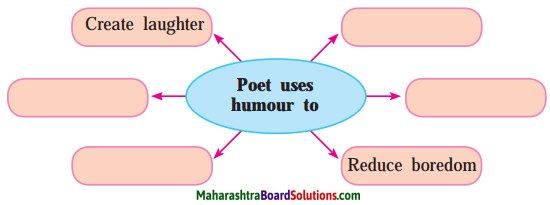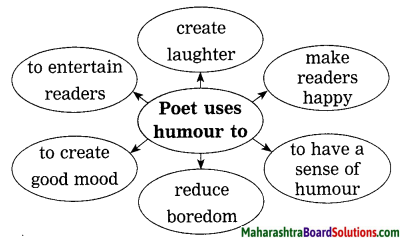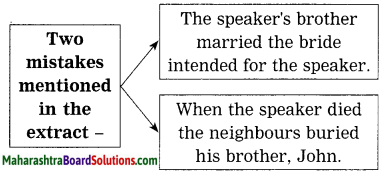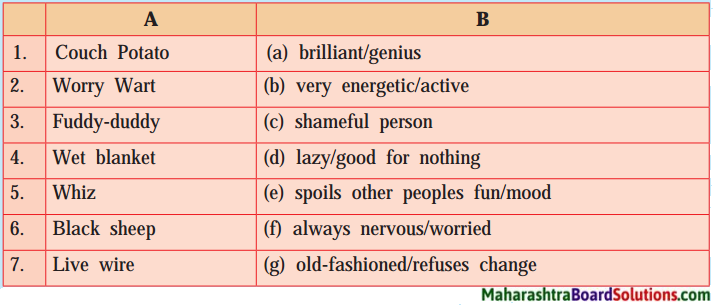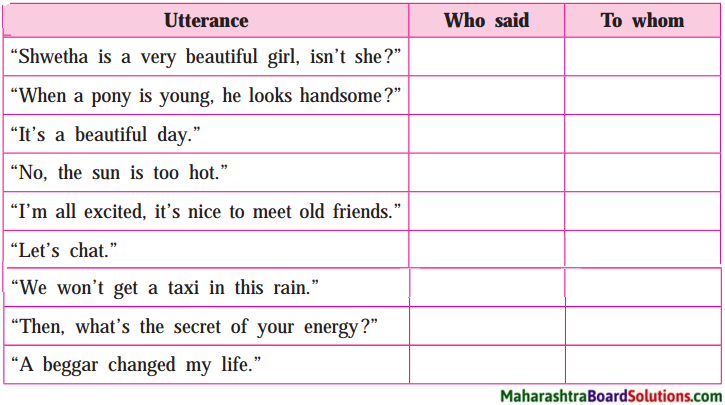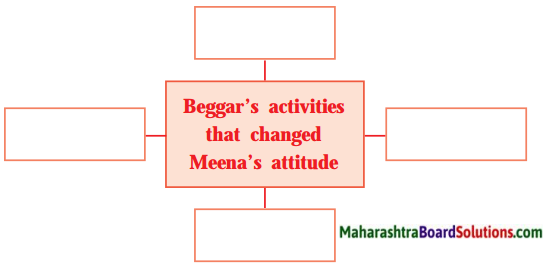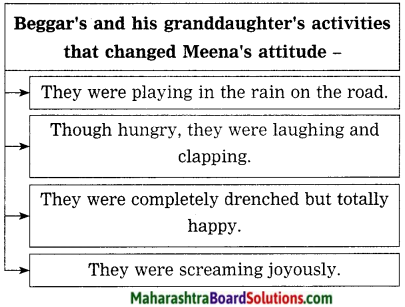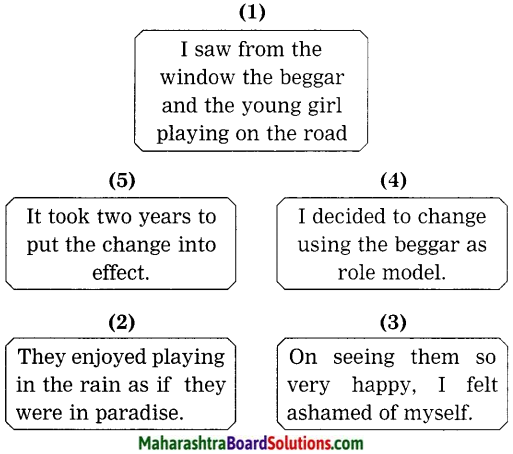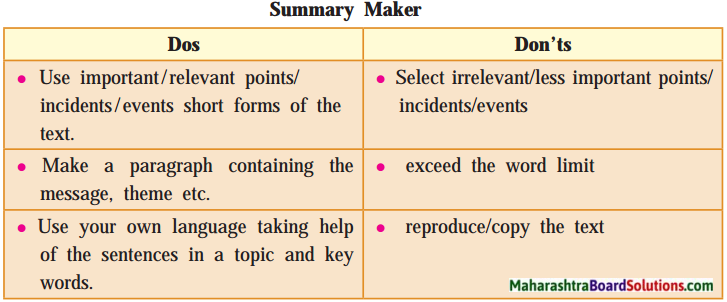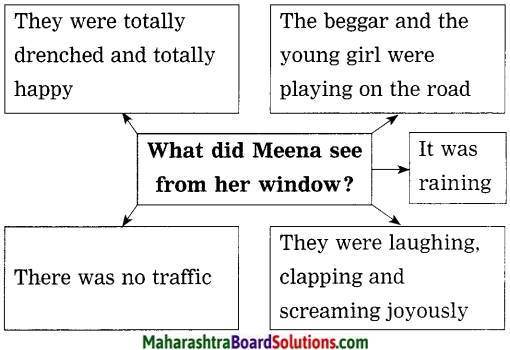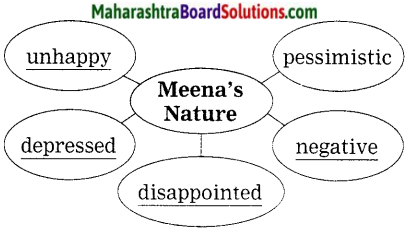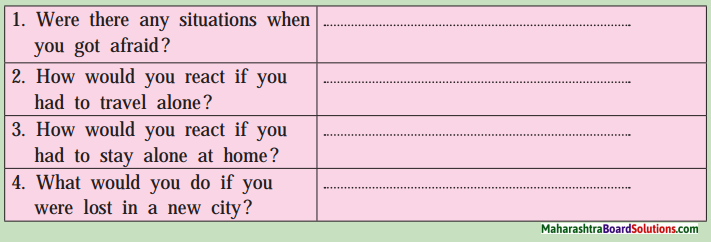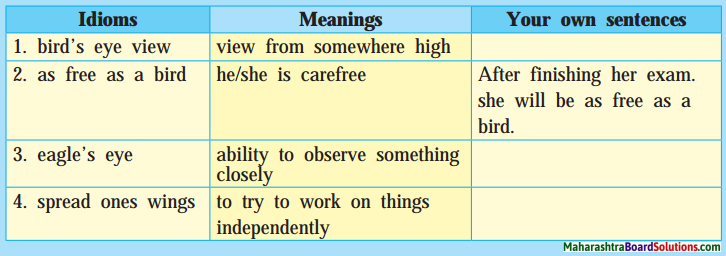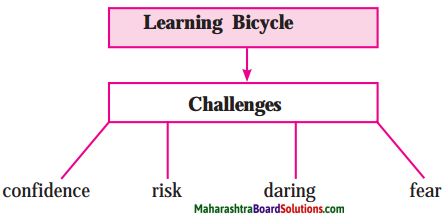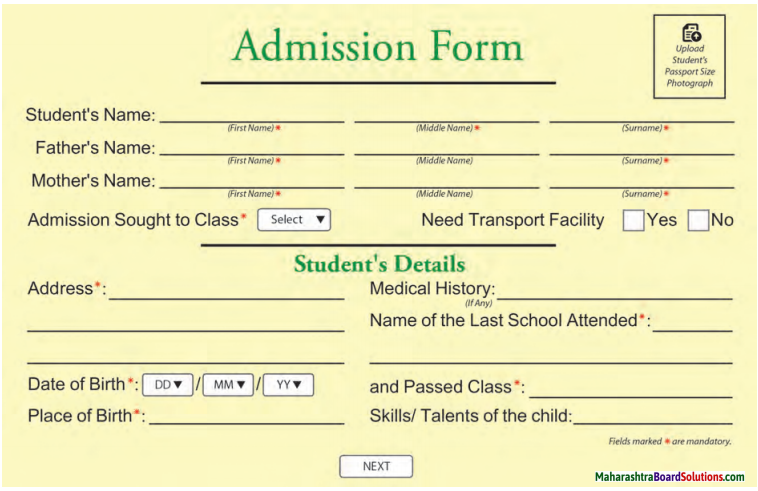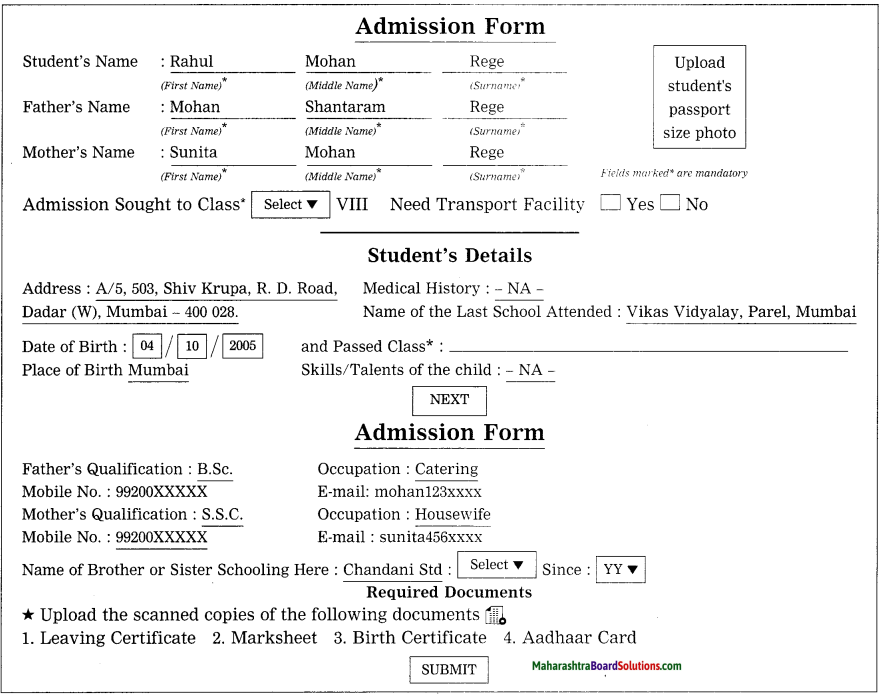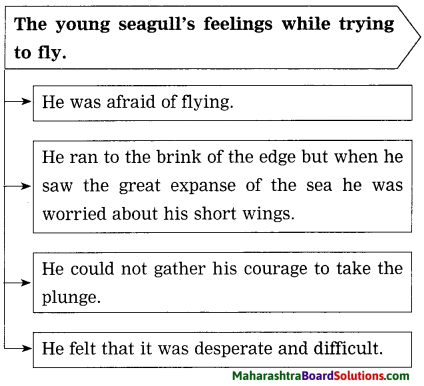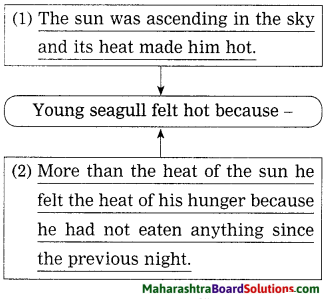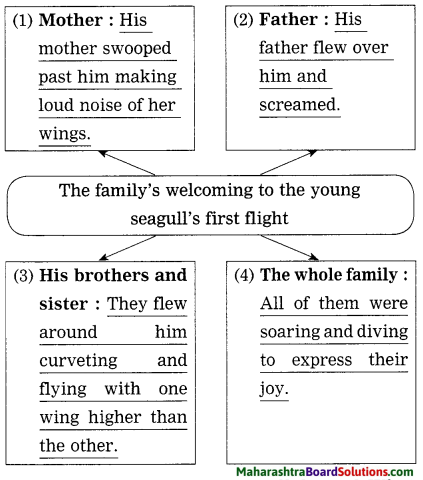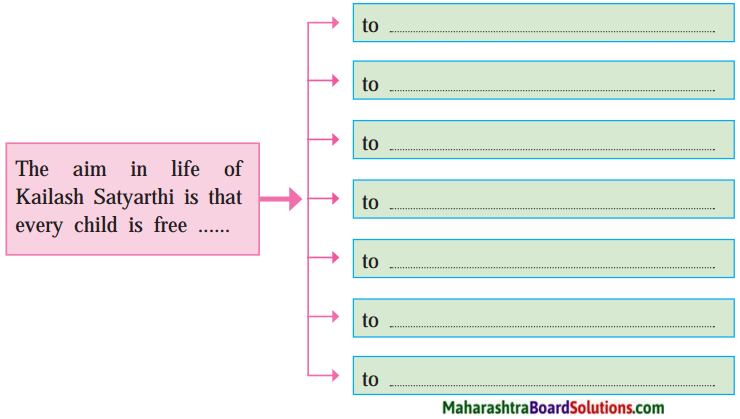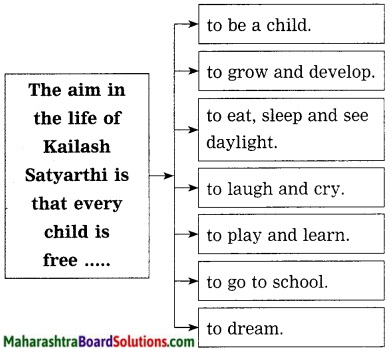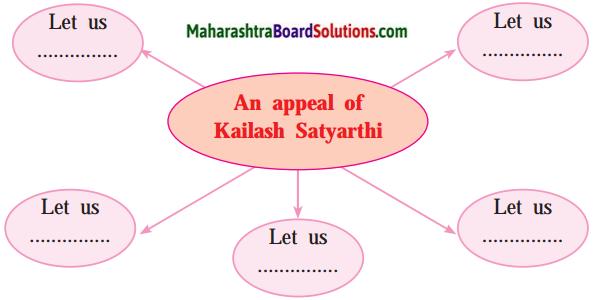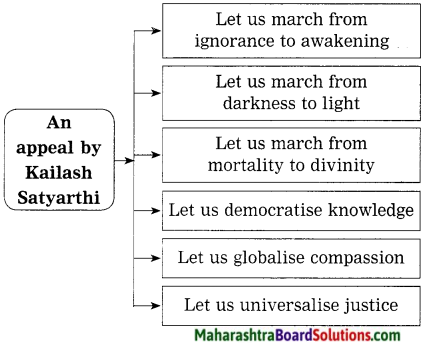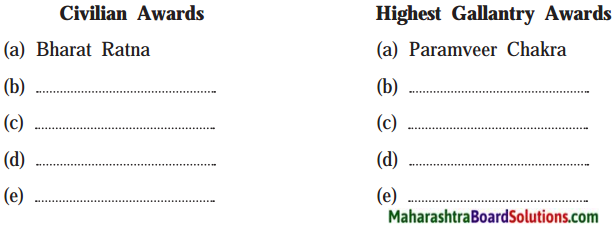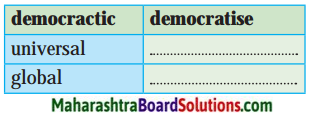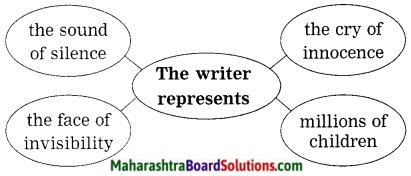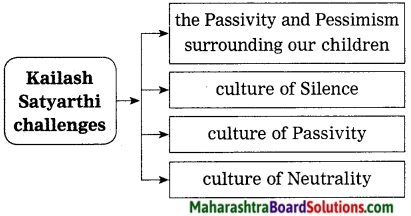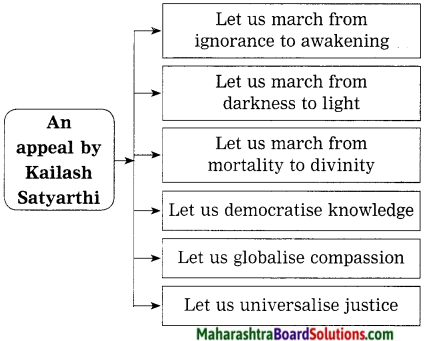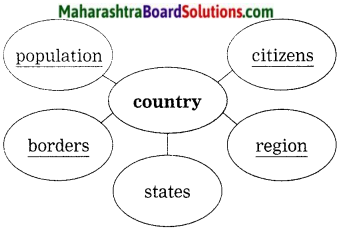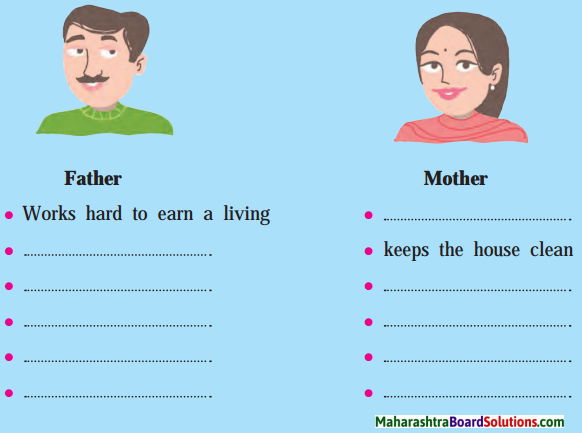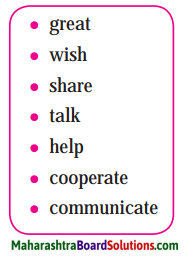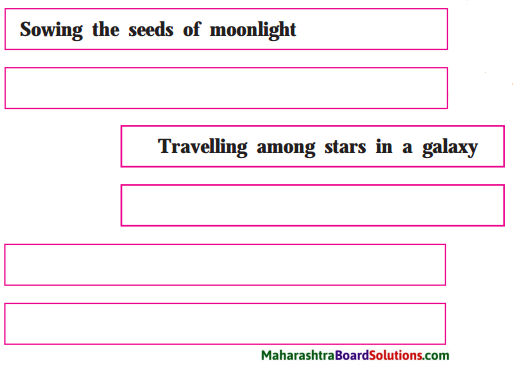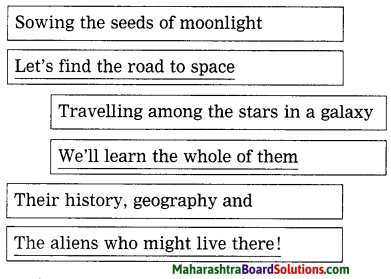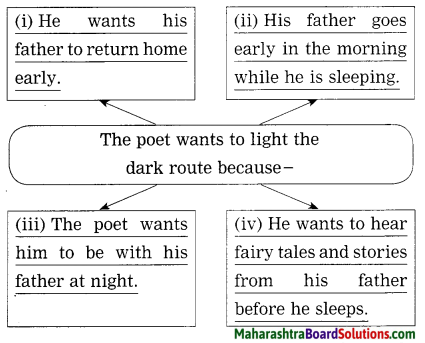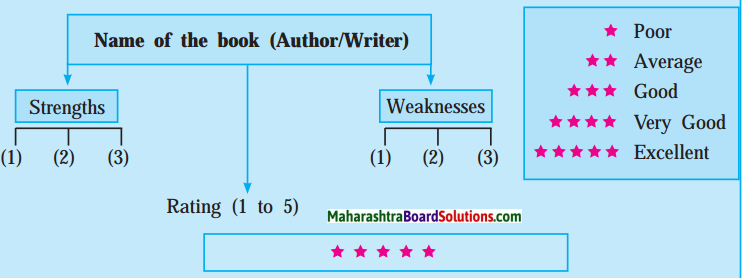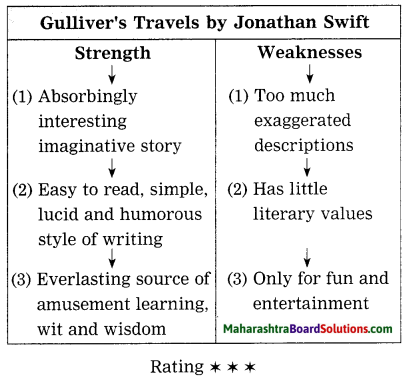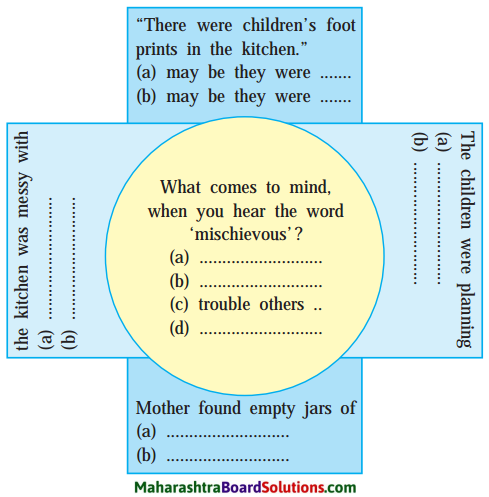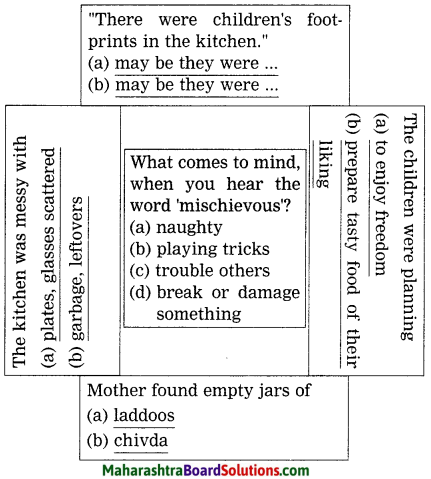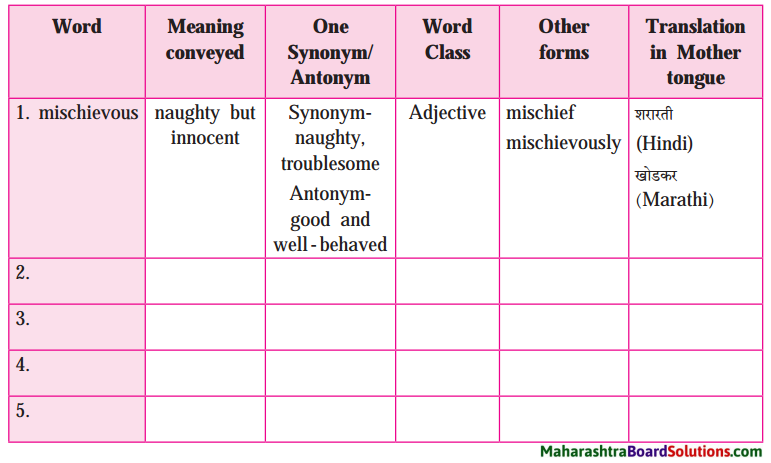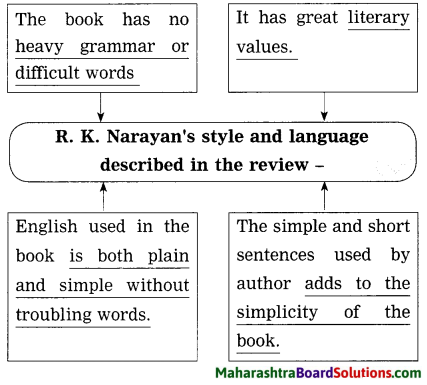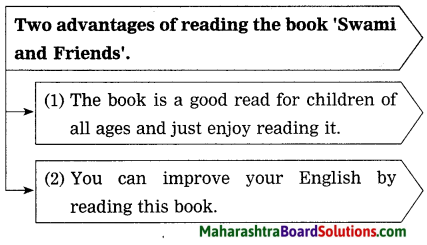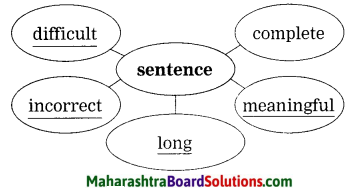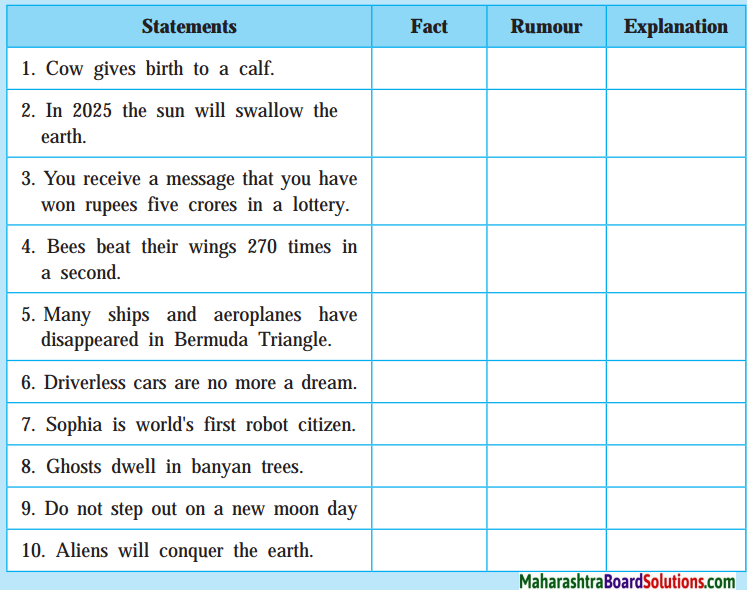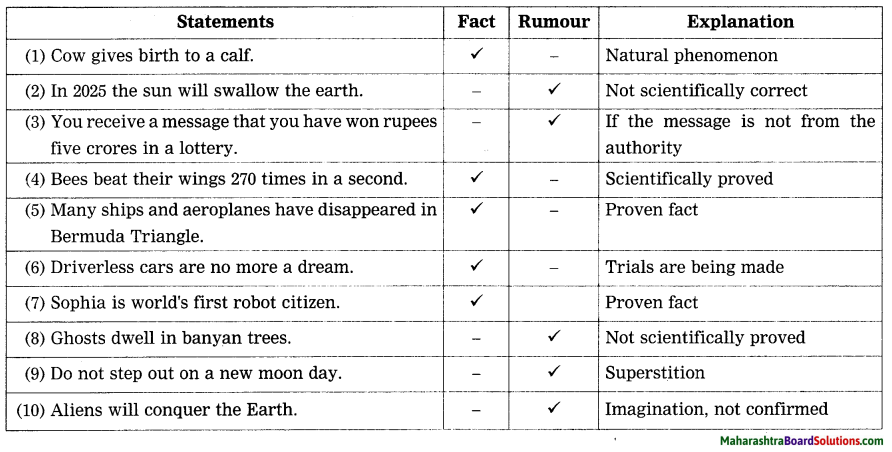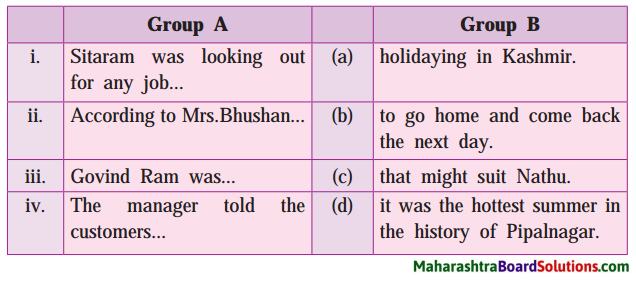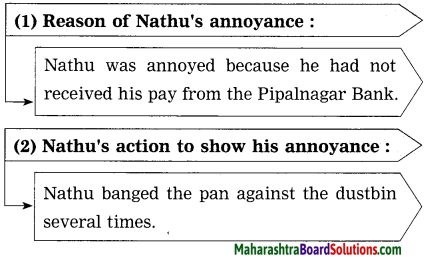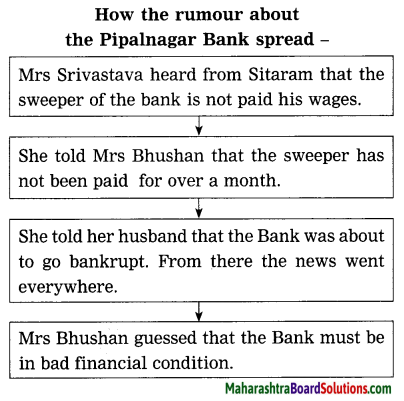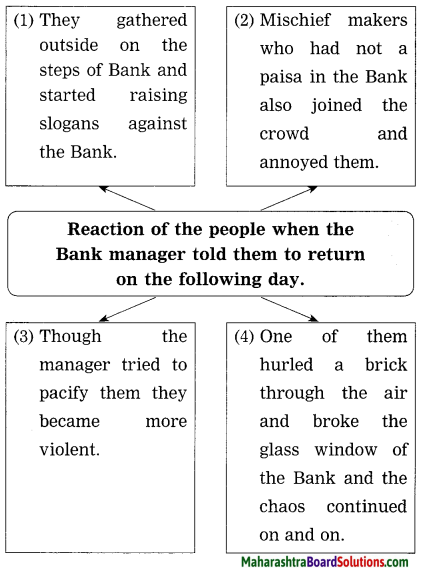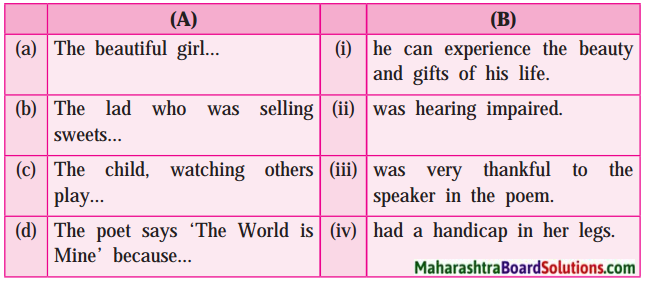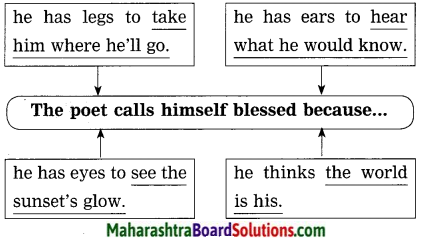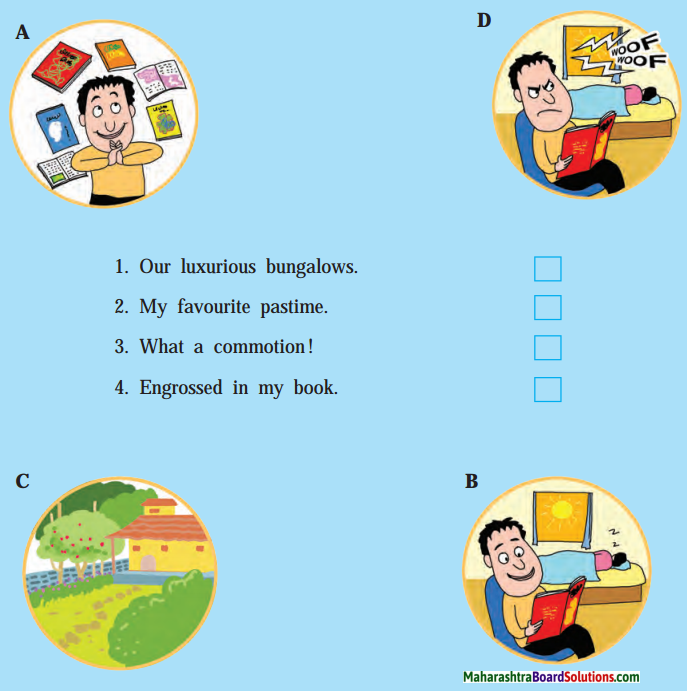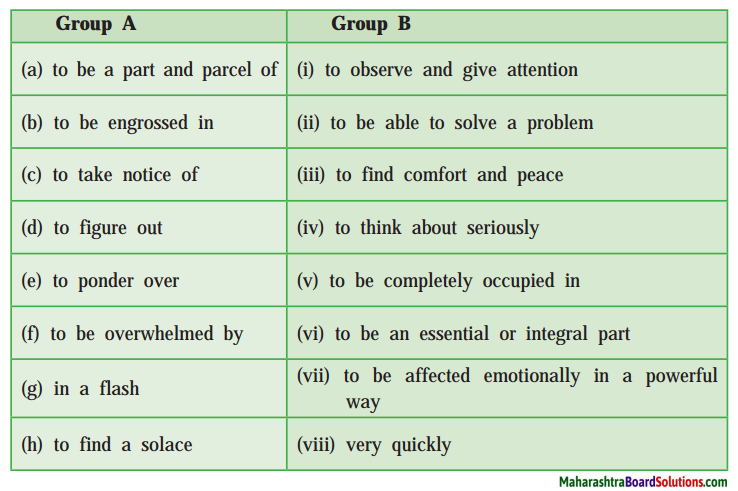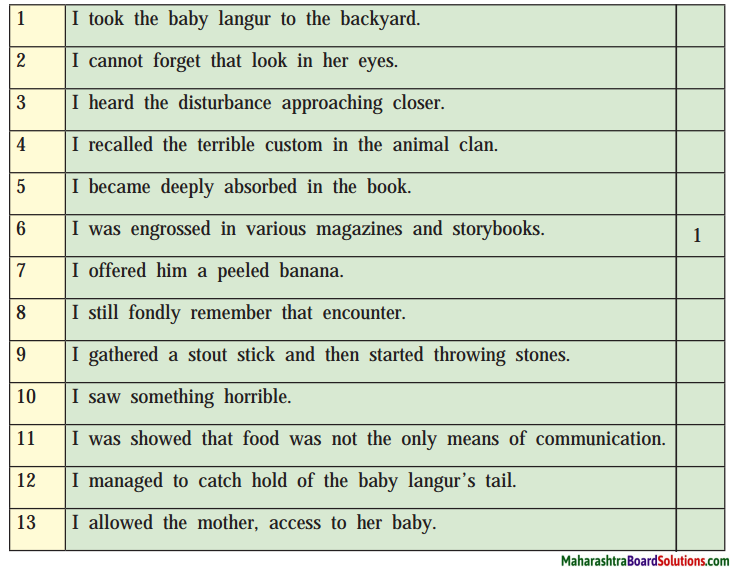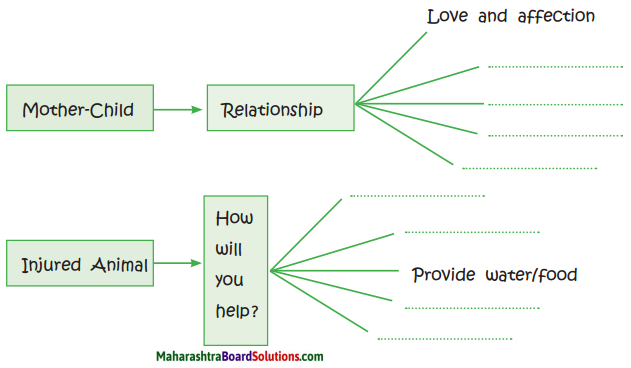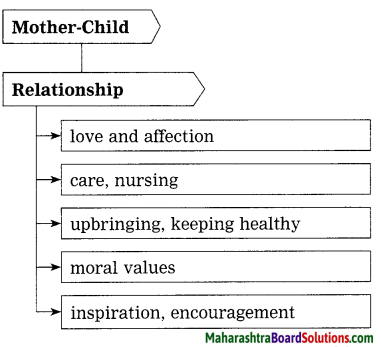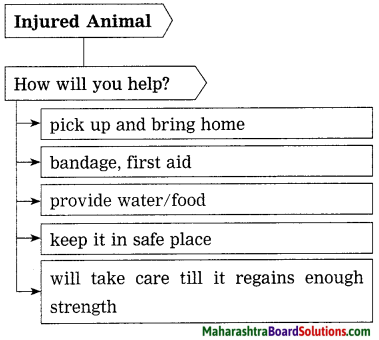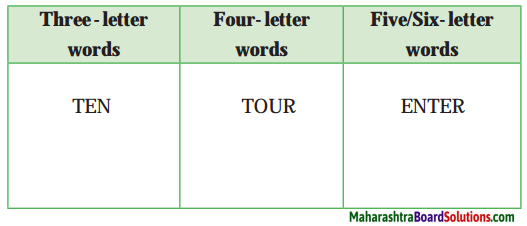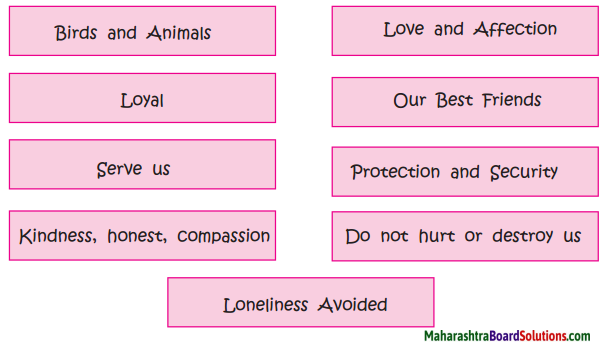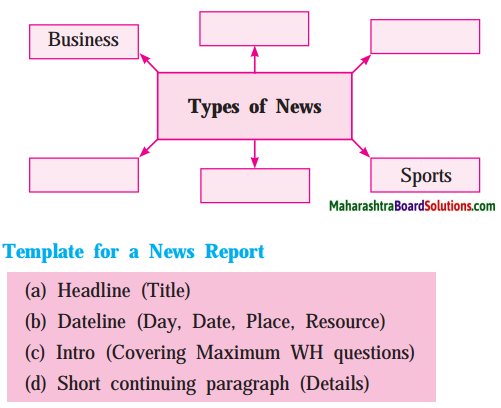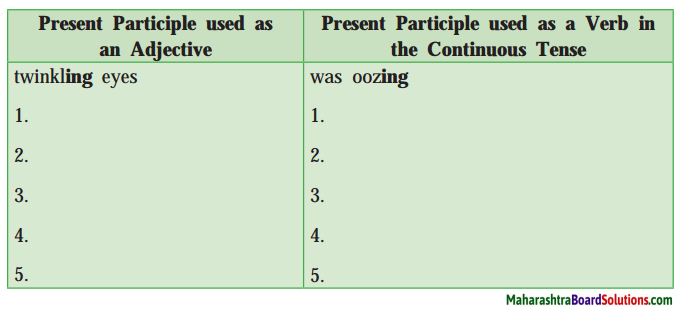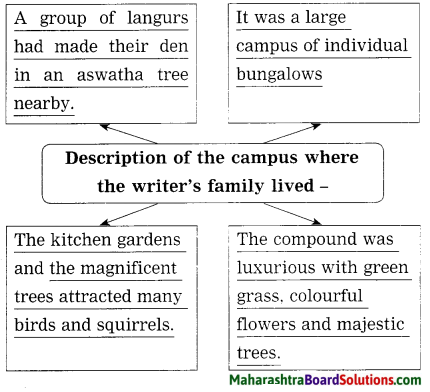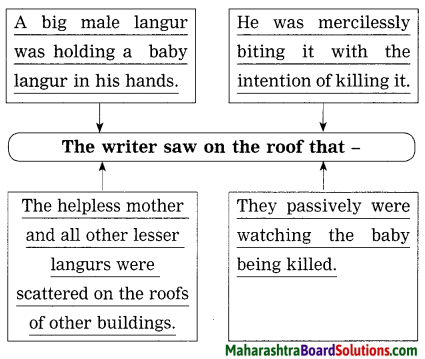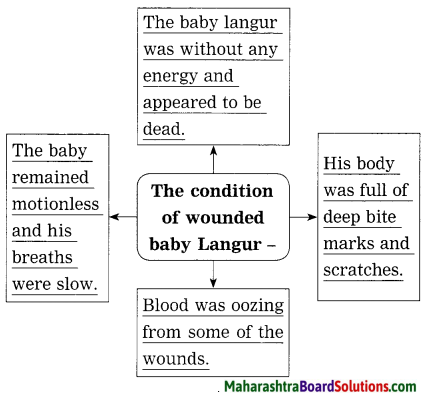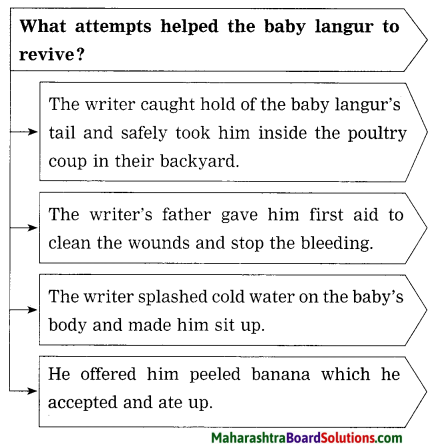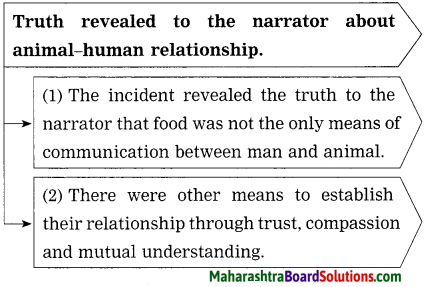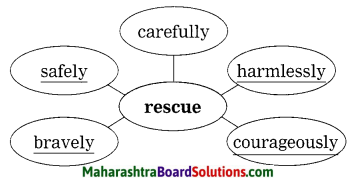Class 10 English Chapter 4.6 Question Answer Maharashtra Board
Balbharti Maharashtra State Board Class 10 English Solutions My English Coursebook Chapter 4.6 A Brave Heart Dedicated to Science and Humanity Notes, Textbook Exercise Important Questions and Answers.
A Brave Heart Dedicated to Science and Humanity Poem 10th Std Question Answer
My English Coursebook Standard Ten Guide Chapter 4.6 A Brave Heart Dedicated to Science and Humanity Textbook Questions and Answers
Warming up:
Chit-chat
Question 1.
Have you ever participated in or visited a science exhibition?
Answer:
Yes, last year I along with my friends participated in ward level science exhibition and selected for district level exhibition.
![]()
Question 2.
Did you observe/learn any new things there ? What are those ?
Answer:
Yes, we observed and learnt a lot there.
- Everyone was busy in his/her experiment.
- Everyone was trying to prove something. We learnt that if we work consistently we can achieve anything in our life.
- The pairs or groups of students were working hard together to make the exhibit successful.
Question 3.
“Scientists have to work very hard and make many sacrifices for years to achieve success in their experiments”. Why?
Answer:
Hard work is the key to success. While working on any project they forget everything around them and concentrate on the experiment while doing so they sacrifice their health, hunger, family, likes, hobbies and then only they are able to carry out the undertaken experiment and get the results of it.
Question 4.
What is the difference between a discovery and an invention?
Answer:
Discovery is the process of finding information, a place or an object, especially for the first time. It is an act of finding something which is in existence but not known before. Invention is something that has never been made or processed before. It is something newly designed or created.
1. Discuss in pairs/groups about the precautions one has to take while working in a science laboratory. Write them in the form of Dos and Dont’s:
Question 1.
Discuss in pairs/groups about the precautions one has to take while working in a science laboratory. Write them in the form of Dos and Dont’s:

Answer:
| Dos | Don’ts |
| 1. Handle test tubes and glass apparatus with care. | 1. Don’t touch chemicals with bare hands. |
| 2. Inform the lab attendant if there is a problem. | 2. Don’t eat, drink, chew gum or apply cosmetics in the lab. |
| 3. Wash your hands before you leave the lab for the day. | 3. Do not work with chemical until you are sure of their safe handling. |
| 4. Wear appropriate safety attire when in the laboratory-safety goggles, lab aprons, etc. | 4. Do not use the phone or computer with gloves on your hands. |
![]()
2. Study the underlined Predicate in each of the sentences below and note the difference:
Question 1.
Study the underlined Predicate in each of the sentences below and note the difference:
Answer:
1. I met Debbie, [(verb (met) + noun (Debbie)]
We study Grammar, [verb (study) + noun (Grammar)]
(The object answers WHAT? or WHO? when asked to the verb.)
2. He become tired, [(verb (become) + complement (tired)]
They are hungry, [(verb (are) + complement (hungry)]
The verbs (became/are) incomplete without the words that follow (tired/hungry.) So ‘tired’ and ‘hungry’ are Complements of the verbs ‘became’ and ‘are’.)
3. She spoke softly.
They live here.
He turned early.
(The verbs in the Predicates are followed by Adverbials since they indicate
How?/Where/When the action in the verb takes place.)
Now Say whether the Predicate in the following sentence contain Object or Complement or Adverbial after the verb:
Answer:
(a) He looked upwards. Complement
(b) My brother is injured. Complement
(c) We scored a goal. Object
(d) We beat the opponents. Object
(e) She answered perfectly. Adverbial
(f) The guests arrived early. Adverbial
(g) I shall be happy. Complement
(h) You wrote the address. Object
English Workshop:
1. Write one sentence each, why the following years were landmarks in the lives of Pierre and Marie Curie:
Question 1.
Write one sentence each, why the following years were landmarks in the lives of Pierre and Marie Curie: (Answers are directly given.)
Answer:
- 1895 – Marie and Pierre got married.
- 1902 – Radium was discovered.
- 1903 – The Curies along with Henry Becquerel were awarded the Nobel Prize in Physics for the discovery of Radium and Polonium.
- 1906 – Pierre was knocked down and killed by a horse-drawn wagon.
- 1911 – Marie was awarded the Nobel Prize for the second time for Chemistry.
![]()
2. Complete the web diagram with the qualities of Madame Curie:
Question 1.
Complete the web diagram with the qualities of Madame Curie:
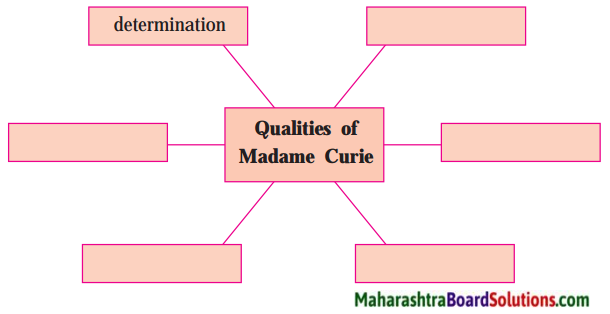
Answer:
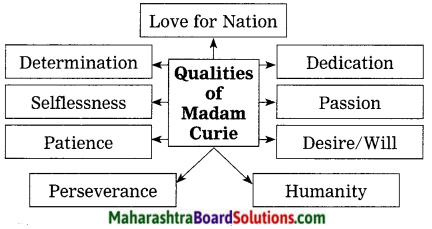
3. Name the following:
Question (a)
Two discoverers of New lands.
1. ……………………..
2. …………………….
Answer:
1. Columbus
2. Vasco da Gama
Question (b)
Two conquerers of the peak of Mt. Everest.
1. …………………..
2. ………………….
Answer:
1. Hillary
2. Tenzing
![]()
Question (c)
Original name of Madame Curie.
…………………………………………….
Answer:
Marja Sklowdaska
Question (d)
Her place of birth.
………………………………………………
Answer:
Warsaw, in Poland
Question (e)
Subjects Marie majored in, at the University of Paris.
………………………………………………
Answer:
Physics and Mathematics.
Question (f)
Nationality of her husband Pierre:
………………………………………………
Answer:
French.
Question (g)
Scientist who discovered the properties of uranium-
Answer:
Henri Becquerel
Question (h)
Two radioactive elements discovered by Curies-
Answer:
Polonium and Radium.
![]()
4. Read the text carefully and match the incidents occured in Madam Curie’s life given in table A with the years in table B.
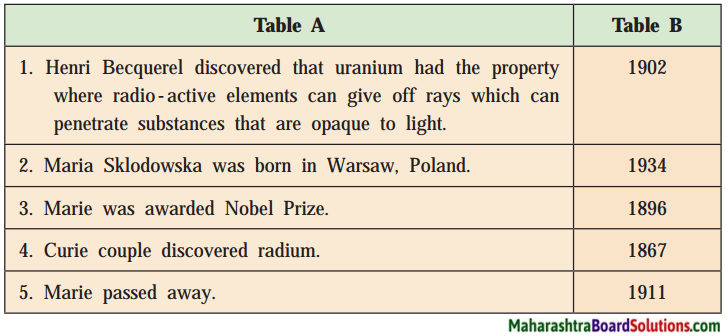
5. Think and answer in your own words.
Question (a)
What common characteristics did Marie and Pierre share, as a student?
Answer:
When Marie went to Sorbonne the University of Paris she spent her days in poverty. Her friend Pierre was brilliant but a poor scientist. Due to lack of money they began to work in a shabby laboratory. Being students they were brilliant scholars but poverty was an obstacle in their way.
Question (b)
Which of the two scientists was greater than the other? Say why.
Answer:
I think Madame Curie was greater than Pierre Curie because she wanted to study in Paris but the poverty at home did not allow her to continue. But with her own efforts and confidence she could fulfil her childhood dream. Even in that condition she got married to a person who was poor. And even after his death, she did not deter and continued her work and was awarded the Nobel Prize. It shows that she was really a great human being and a scientist.
Question (c)
Why was the gift of a ton of pitchblende, a great stroke of luck to the Curies?
Answer:
Being very expensive the Curies couldn’t buy pitchblende on a large scale but when their admirer, the emperor of Austria gifted them the most precious gift of a ton of pitchblende they could do their experiment on a large scale and find out what they wanted to achieve. So it was a great stroke of luck to the Curies.
![]()
Question (d)
Besides the uses of Radium and Polonium mentioned in the text, in what other way do you think, it is used in the field of medicine?
Answer:
Radium is used to produce radon gas which in turn, is used to treat cancer. Radiation given off by radium is sometimes used also to study the composition of metals, plastics and other material.
The alpha rays emitted by Polonium can be used to eliminate static electricity. Polonium is also used in anti-static brushes to eliminate dust on photographic film.
Question (e)
What proves that Marie Curie was a true lover of humanity and not of wealth?
Answer:
Marie Curie could have patented her discovery and earned a lot of money. But she believed in working for Science and whatever she discovered belonged to the people and not to her so in real sense she thought about humanity not money. She was a true lover of humanity and not of wealth.
6. Find words/phrases from the text that are synonyms of the word ‘brave’:
Question 1.
Find words/phrases from the text that are synonyms of the word ‘brave’:
Answer:
courageous indomitable powerful
7. Read and understand the following words. Find out/search for proverbs/thoughts/quotes/ slogans that are related to each of them:
Question 1.
Read and understand the following words. Find out/search for proverbs/thoughts/quotes/ slogans that are related to each of them:
Answer:
(a) Courage: Courage is the complement of fear. One with courage to laugh is master of the world. Courage is a kingdom without a crown.
(b) Strength of character: Knowledge will give you power, but weakness of attitude becomes weakness of character.
(c) Determination: A dream doesn’t become reality through magic, it takes sweat, determination and hardwork. The difference between the impossible and the possible lies in a man’s determination.
(d) Hard-work: Success is the result of perfection, hardwork, learning from failure, loyalty and persistence. There is simply no substitute for hardwork when it comes to achieving success.
![]()
8. Match the branches of Science with what fields they study:
Question 1.
Match the branches of Science with what fields they study:
| ’A’ | B’ |
| (a) Ecology | (i) Study of Atmosphere |
| (b) Geology | (ii) Study of Plant-life |
| (c) Meteorology | (iii) Study of the Universe |
| (d) Anatomy | (iv) Study of living organisms and environment |
| (e) Botany | (v) Study of human mind and emotions |
| (f) Psychology | (vi) Study of structure and functions of the body |
| (g) Cosmology | (vii) Study of solid earth and rocks |
Answer:
(a) Ecology – Study of living organisms and environment
(b) Geology – Study of solid earth and rocks
(c) Meteorology – Study of Atmosphere
(d) Anatomy – Study of structure and functions of the body
(e) Botany – Study of Plant-life
(f) Psychology – Study of human mind and emotions
(g) Cosmology – Study of the Universe
9. Imagine that your school needs some Scientific equipment, apparatus and formulae charts for the laboratory. Being the in-charge of Science Committee, write a letter to the Headmaster of your school suggesting him some Scientific equipment and apparatus required for Standard X Science practicals. Take help of the information given below to complete your letter.
Question 1.
Imagine that your school needs some Scientific equipment, apparatus and formulae charts for the laboratory. Being the in-charge of Science Committee, write a letter to the Headmaster of your school suggesting him some Scientific equipment and apparatus required for Standard X Science practicals. Take help of the information given below to complete your letter.
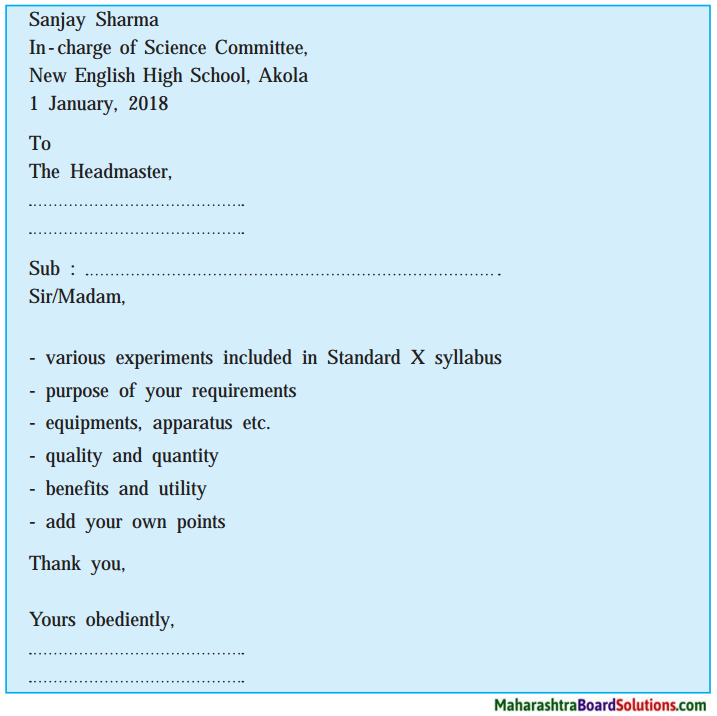
Answer:
Sanjay Sharma,
In-charge of Science Committee,
New English High School,
Akola-444 001.
1 January, 2020.
To,
The Headmaster,
New English High School,
Akola.
Subject: Requirement of scientific equipment, apparatus and formulae charts for the laboratory.
Respected sir,
With regard to learning Science content, processes and views of the nature of Science experiments play significant role in Science. As per the new syllabus, new subjects and some experiments are included in revised Science coursebooks. Experiments give immense pleasure of self-learning and observations.
The equipment and apparatus that we have been using in our Science laboratory are outdated and rarely of any use. If we bring some new, definitely it will arose interest in learning Science and doing some experiments on our own. Being in-charge of Science Committee, I request you on behalf of all students and teachers to bring following equipment and apparatus in our Science laboratory.
- 2 compound microscope
- 2 Hand lens
- 6 Beakers
- 3 Beakers Tongs
- 3 Test Tube holder
- Thermometer
- Safety goggles-6
- 6 funnels
- 1 microwave oven
- 2 pipette
- Graduated Cylinder
- Vernier Calliper
- Meters
- Compass
- Stop clock
You are well aware that due to lack of equipment our Science teachers can’t conduct some experiments in the lab.
Hope you will understand our difficulty and buy the listed equipment and apparatus as early as possible so that the subject of Science can be well understood by doing various experiments in the laboratory.
Anticipating your valuable help in this respect.
Thanking you,
Yours obediently,
Sanjay Sharma
In-charge of Science Committee.
![]()
10. ‘There is no short-cut to success’. Expand this maxim with a suitable introduction, body, examples and conclusion. Write it in your notebook in about 20 lines.
Question 1.
‘There is no short-cut to success’. Expand this maxim with a suitable introduction, body, examples and conclusion. Write it in your notebook in about 20 lines.
Answer:
‘There is no Short-cut to Success.’
It is often said that success requires hardwork and great diligence as well as commitment. This makes success a long-term achievement. Everybody thinks that there are some easier ways to live life, no need to work hard for livelihood but the truth is that easier ways are always the toughest ways. Most of us forget that for reaching success, the road is not strewn with roses. Success is an achievement by constant diligence and most of us lack the essential quality, diligence. The magic of hardwork and perseverance cannot be underestimated.
Most of the time it happens that we start our efforts but soon lose heart half-way and give up our efforts and thus fail to reach the pinnacle of success. If we have the confidence in our efforts, there is nothing that can deter us from achieving. Sitting in front of Television and watching the shopping network channel, fascinating over the new-miracle making abs machine which promises you the six- pack abs only in 5 minutes of daily exercises, you think that product is heaven sent, so you grab your phone book the order and start dreaming about your perfect body. Two months later, that wonder abs machine is at the back of your master closet gathering dust. As you can see, you will have to do the work when reaching a goal and the success that comes with it.
You have to understand that you might have to make sacrifices during your journey and you need to put in the hours required in order to get where you want to reach. Those who sit pretty and just complain about the success of others are the ones who do not do much in life. Those who make continuous efforts for a long time in the right direction rarely lose in the struggle of life. So one important password for all of us to follow is that there is no short cut to success.
Project:
The life and work and inventions of Marie Curie are given in detail in the text. Go to your library or search on internet at least five famous scientists who have given great inventions to the world and write about them or prepare a chart showing the information about them.
![]()
Language Study:
1. Pick out the Prefixes and Suffixes from the following words and find the root word:
Question 1.
Pick out the Prefixes and Suffixes from the following words and find the root word:

Answer:
| Word | Prefix | Suffix | Root Word |
| 1. unattainable | un | able | attain |
| 2. indomitable | in | able | – |
| 3. disheartening | dis | ing | hearten |
| 4. incalculable | in | able | calculate |
| 5. disconsolate | dis | ate | console |
| 6. ensuring | en | ing | sure |
2. Say whether the Predicates in the sentences below contain Objects/Complements/Adverbials:
Question (A)
Say whether the Predicates in the sentences below contain Objects/Complements/Adverbials: (Answers are directly given.)
Answer:
(a) Madame Curie discovered radium. – Object
(b) Pierre was knocked down. – Complement
(c) Pitchblende was expensive. – Complement
(d) The couple took a flat. – Object
(e) They moved cautiously, success came finally. – Adverbial
Question (B)
Pick out the Conjunctions in the following sentences and say whether they are Subordinators or Coordinators.
Answer:
(a) There are women who show extreme courage. – who – subordinator
(b) Pitchblende was an extremely expensive substance, so they could not afford to buy. – so-subordinator
(c) After her daily household work, Marie settled down to studv. – After-subordinator
(d) Marie wanted to study in Paris but her father could not afford it. – but-coordinator
(e) History is full of chapters that tell of extraordinary people! – that-subordinator
Live English!
Question (a)
What is Blogging?
Answer:
The term blog is short for web log. It is an online public diary which lists each diary entry in reverse order so that new diary entries are placed on the top of the page, and older entries are placed below. Each entry is called a post.
![]()
Question (b)
Who Blogs?
Answer:
Anyone can create a blog, if they have a basic understanding of the way the software works. There are privately owned blogs on individual webpages, which require a little knowledge about creating webpages, but there are also blog creation services which allow you to quickly and easily set up your own blog. You can add posts as often as you like, and can say almost anything that you want. Blogs are created for a lot of different reasons, and by many different people.
Question (c)
What Are Blogs About?
Answer:
There are many topics that a blog may contain, depending on who is updating it and why. Many blogs provide news or comment in response to a particular subject, like local news, politics or even hobbies. Food blogs are popular for people who want to share recipes, and many political activists and writers have blogs which are used to respond to current political topics. Many blogs also function as personal online diaries.
Question (d)
Blog Classification
Answer:
A blog is usually textual, based on news and commentary, although there are other types of blogs which are gaining popularity. Artlogs are blogs which focus on art, Photoblogs focus on photography, Sketch- blogs focus on sketching, and so on. There are also a few specialised types of blogs, including Vblogging or video blogging, and Podcasting or audio blogging.
Question (e)
Creating a Blog on the Internet
Answer:
If you have a good understanding of webpage design and development, you may be able to create your own blog on a personal website. Otherwise, your best option is to choose a website that does the setting up for you, so that all you have to do is join, customise a little and begin to write. There are many blog websites like www.livejournal.com, www.wordpress.com, www.blogger.com or www.blogs.myspace.com which will allow you to quickly and easily create your own blog. They also give you the option to set controls so that you can choose to allow only friends or only yourself to read them.
Question (f)
Blog Popularity
Answer:
Blogs are becoming more and more popular for many reasons. This is because they offer a wealth of information on a lot of different topics. They also drive traffic to websites by attracting new visitors with interesting blog column commentary. Blogs are a great tool because they allow anyone to express themselves on the Internet. If you are looking for a way to express yourself online, or to share information regarding a favourite subject of yours, beginning your own blog may be the best option for you because everyone has an opinion on the Internet, and soon everyone will have their own personal weblog too.
![]()
Now with the help of your teacher create your own Blog on one of the following given topics.
1. Your experiences and recently celebrated birthday party.
2. Your expectations from the school.
3. Describe the surroundings of your residence.
4. Describe a cultural programme/campaign/project conducted at your school.
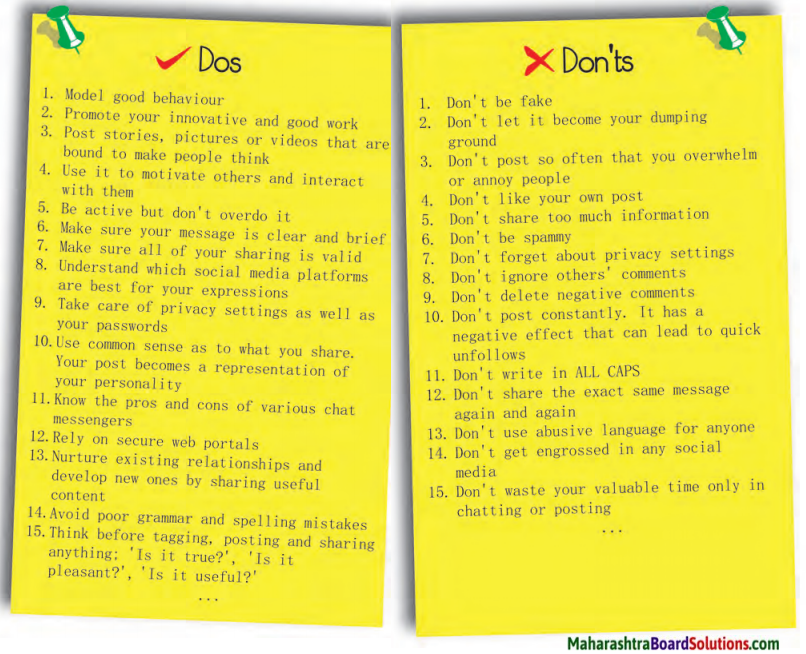
My English Coursebook 10th Digest Chapter 4.6 A Brave Heart Dedicated to Science and Humanity Additional Important Questions and Answers
Simple Factual Activities:
Question 1.
Write the importance of the years. (Answers are directly given.)
Answer:
1. 1867-Marie Curie was born.
2. 1895-Marie and Pierre got married.
Question 2.
State whether the following statements are True or False:
Answer:
- Pitchblende is a black, very hard and cheap substance – False
- Men could see many substances through the powerful rays of Uranium. – True
- The emperor of Austria gifted a ton of pitchblende to the Curies – True
- The Curies sacrificed all their luxuries of life to save money to buy pitchblende. – True
![]()
Name the following:
Question 1.
An admirer of the Curies.
Answer:
The emperor of Austria.
Question 2.
A black, very hard and expensive substance-
Answer:
Pitchblende.
Complex Factual Activities:
Question 1.
What qualities do great achievers possess?
Answer:
Great achievers possess qualities like commitment, courage, dedication and singleness of
purpose in their effort.
Question 2.
What information do you get about Marie’s early life?
Answer:
Marie was born in a poor family. Her childhood dream was to study Science in Paris but her father could not afford the expenses for this. So she worked as a governess and saved a little money and went to Sorbonne, the University of Paris to study science. Thus she worked hard in her childhood to fulfil her dream.
Question 3.
What are the signs of poverty suffered by the young couple? ( wt WT oTFlcft?)
Answer:
The young couple was very poor indeed. They started their journey from a shabby laboratory. They took a flat in Paris which contained hardly any furniture. Marie used to work and settle down to study in laboratory in a wooden shed near their flat. It had a leaky skylight and an earthen floor. All these things are the signs of poverty suffered by the young couple.
![]()
Question 4.
Complete the following sentences:
(Answers are directly given and underlined.)
Answer:
- Madame Curie dedicated her life to the cause of Science and to the welfare of humanity.
- The qualities that great achievers possess are extraordinary courage, determination and singleness of purpose.
- Marie Curie could not study Science in Paris and fulfil her childhood dream because her father could not afford the expenses of her studies.
- Marie and Pierre set up a laboratory in a wooden shed near their flat.
Question 5.
What proves Marie’s strong will power?
Answer:
When the couple could not buy pitchblende which was an expensive substance they sacrificed all the luxuries of life to save money. They lived in extreme poverty. They could not buy costly food and warm clothes for extremely cold Parisian winter. They could not sleep due to lack of warmth. Marie refused to take rest whenever her husband begged her to give up the struggle. All the above incidents prove that Marie had a strong will power to achieve the aim of her life.
Question 6.
Why were the two new substances named Polonium and Radium?
Answer:
When Pierre and Marie found two new substances in their new discovery, she called one Polonium in honour of her country Poland and being the most powerful of the radioactive elements another was called “Radium”.
Question 7.
Which gift did she receive from the emperor of Austria? Why was it the most precious for them?
Answer:
Pitchblende is a very expensive substance which Pierre and Marie could not afford to buy in large quantity for their experiments. The emperor of Austria was an admirer of the Curies. So he gifted them a ton of pitchblende so that the Curies could carry out their experiments easily.
Question 8.
How is radium used in the medical field?
Answer:
The benefits of radium in the world of medicine are incalculable. It has been used with great effect in treatment of cancer. The bacteria of such diseases as typhus, cholera and anthrax can also be killed by radium so it was a great gift in the medical field.
Question 9.
How did Pierre meet with an early death?
Answer:
In 1906 Pierre was knocked down and killed by a horse – drawn wagon and thus met with an early death leaving Marie disconsolate.
Question 10.
What makes Marie Curie an exceptional scientist?
Answer:
When Marie and Perrie discovered Radium and Polonium they could have patented their discovery and become rich but Marie refused to do so and gave it free to the world and the world of medicine. She also believed that Radium belongs to the people not to her. She worked selflessly without expecting money. Her humanity and selflessness make Marie Curie an exceptional scientist.
![]()
Question 11.
Describe how Curies first sighted Radium. What was its colour?
Answer:
After continuing their work for more than four years on a September night, the Curies after a day’s tiresome work, went to the laboratory to have another look at the hundreds of small bowls into which they had poured filtered pitchblende. While moving forward in the dark laboratory they found rays of soft, bluish purple light coming from the small glass-covered bowls. Thus they sighted the Radium for the first time. Its colour was bluish purple.
Activity-based on Vocabulary:
Question 1.
Find out the words from the passage which mean:
- unbeatable
- discouraging
- hardly
- illiteracy
Answer:
- indomitable
- disheartening
- scarcely
- ignorance
Question 2.
Find out antonyms for the following from the passage: (Answers are directly given.)
Answer:
- economical × expensive
- poverty × luxury
- chill × warmth
- worthless × precious
Question 3.
Write down the describing words used for the following nouns:
- work
- pitchblende
- colour
- desire.
Answer:
- tiresome work
- filtered pitchblende
- beautiful colour
- compulsive desire
![]()
Activities based on Contextual Grammar:
Question 1.
Her father could not afford the expenses of her education in Paris. (Make it affirmative.)
Answer:
Her father was unable to afford the expenses of her education in Paris.
Question 2.
Her life in the University was a disheartening experience in poverty and hunger. (Make it negative.)
Answer:
Her life in the University was not an encouraging/heartening experience in poverty and hunger.
Question 3.
Marie took a job as a governess and saved a little money. (Rewrite using ‘by’ + ing.)
Answer:
Marie saved a little money by taking a job as a governess.
Question 4.
Marie Curie’s childhood dream was to study science in Paris, but her father could not afford the j expense for this. (Rewrite using’Though’.)
Answer:
Though Marie Curie’s childhood dream was to study science in Paris, her father could not afford ; the expense for this.
Change the degree:
Question 1.
Pitchblende was the most precious gift the Curies had received.
Answer:
(a) Positive – No other gift the Curies had, received was as precious as pitchblende.
(b) Comparative – Pitchblende was more precious gift than any other gifts the Curies had received.
Question 2.
Pitchblende is one of the most expensive substances.
Answer:
(a) Positive – Very few substances are as expensive as pitchblende.
(b) Comparative – Pitchblende is more expensive substance than most other substances.
![]()
Change the voice:
Question 1.
In 1906, Pierre was knocked down by a horse – drawn wagon. (Begin the sentence with ‘A horse-drawn wagon’.)
Answer:
A horse-drawn wagon knocked down Pierre in 1906.
Question 2.
In 1911, Marie was awarded the Nobel Prize. (Begin the sentence with ‘They’)
Answer:
They awarded Marie the Nobel Prize in 1911.
Personal Response:
Question 1.
Describe your favourite scientist.
Answer:
C.V. Raman who won the Nobel Prize for Physics in 1930 is my favourite scientist. He was the first Asian and first non-white to receive any Nobel Prize in Science. He was the first to investigate the harmonic nature of the sound of the Indian drums such as the tabla and the Mrudangam. He discovered that, when light traverses a transparent material, some of the deflected light changes in wavelength.
Question 2.
What qualities, do you think, are important to get success in our life?
Answer:
There are some key components of success without which we cannot succeed in our life. First our mindset-without a positive mindset the rest of these components won’t have as much power as they should. Staying focused on goal is also important. Besides it, dedication, discipline and determination are important factors to get success in our life.
Question 3.
Why are awards and prizes given to the people in different fields?
Answer:
An award or a prize is something given to a person, in recognition of his or her excellence in a certain field. It may also simply be a public acknowledgement of excellence. It boosts the j recipient’s confidence. It also encourages and inspires him/her to do better in his/her life. It also inspires other people in different fields to achieve something great.
![]()
Language Study:
1. Coordinators: Coordinators are words that join grammatically, equal units together. E.g., and, but, or, nor are the main Coordinators.
2. Subordinators: Words whose function is to establish an unequal grammatical relationship are called subordinators. that, for, who, whether, if, because, so. Dependent clauses Principal clause that, for, who, whether, if, because, so subordinate conjunctions (subordinators)
Do as directed:
Question 1.
Complete the words by using correct letters:
Answer:
- bre _ d – bread
- b i _ t h – birth
- la _ ge – large
- p r i _ e – prize
Question 2.
Put these words in alphabetical order:
1. lifeless, hostile, endurance, progress
2. commitment, characterise, courage, costly
Answer:
1. endurance, hostile, lifeless, progress
2. characterise, commitment, costly, courage
Question 3.
Punctuate the following sentences:
1. do you remember the day when you told me that you wanted radium to have a beautiful colour marie said to her husband
2. she replied i am working for science radium belongs to the people not to me
Answer:
1. “Do you remember the day when you told me that you wanted radium to have a beautiful colour?” Marie said to her husband.
2. She replied, “I am working for science. Radium belongs to the people, not to me.”
![]()
Question 4.
Make four words (minimum 3 letters each) using the letters in the given word: ‘ incalculable’
Answer:
- ill
- call
- able
- cube
Question 5.
Write related words as shown in the example:
(Answer is directly given and underlined.)
Answer:

Question 6.
Complete the word-chain of verbs. Add four words, each beginning with the last letter of the previous word!
eat → t……….., ……………, ………….., …………….
Answer:
eat → take , extend , develop , paddle.
1. Attempt any one:
Question (a)
Make a meaningful sentence of your own using the phrase: ‘to fight against ’
Answer:
Kailash Satyarthi has been fighting against child labour for the last several years.
OR
Question (b)
Add a clause to the following sentence to expand it meaningfully:
The history is the subject ………………. .
Answer:
The history is the subject which gives the narration of episodes happened in the past.
![]()
2. Attempt any one:
Question (a)
Add prefix or suffix to make new words :
1. ignore
2. dedicate
Answer:
1. ignorance
2. dedication
OR
Question (b)
Make a meaningful sentence using any one of the following words :
1. ignore
2. dedicate
Answer:
1. Don’t ignore your parent’s advice.
2. Dedicate your life for poor; the father told his son.
Live English:
Blogging:
- Terms – (Blogging)
- Blog – Web log which is an online public diary.
- Purpose – Anybody can create blog for any reason.
- About – Function as personal online diaries
- Types – Artlogs – Focus on art
- Photologs – Focus on photography
- Sketch – Focus on sketching
blogging – Video blogging - Podcasting – Audio blogging
- Creating – You can create your own blog on a personal website or any other websites like www.livejournal.com, www.wordpress.com, www.blogger. corn, www.blogs.rny-space.com
- Popularity – Blogs allow anyone to express themselves on the Internet and it becomes popular if people like it.
![]()
Steps of creating blogs:
Starting a blog is the best way to share your Ideas and expertise online.
Follow the given steps to create your blog.
- Choose your blogging platform. (word press)
- Choose a Domain name. (www.yourblog.com)
- Sign up with Web Host and install Word Press (www.bluehost.com is good hosting provider)
- Sign up with a web hosting.
- Choose the hosting plan.
- Choose the domain name you want.
- Complete your registration.
- Install wordpress with one-click installation.
- Log into your new blog.
- Customizing and choosing a blog theme.
- Adding Post and Pages.
- Get Traffic and monetize your blog.
My English Coursebook 10th Class Solutions Pdf Unit 4
- The World is Mine Class 10 English Solutions
- Bholi Class 10 English Solutions
- O Captain! My Captain! Class 10 English Solutions
- Unbeatable Super Mom – Mary Kom Class 10 English Solutions
- Joan of Arc Class 10 English Solutions
- A Brave Heart Dedicated to Science and Humanity Class 10 English Solutions
